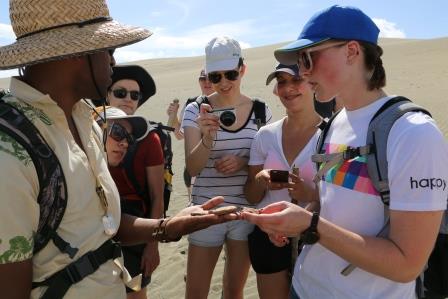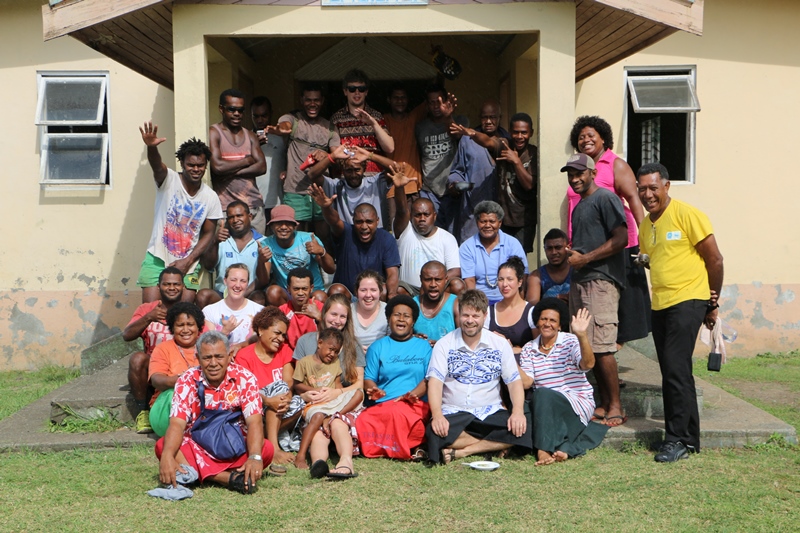Marcus Butler
29 August 2016: An annual student trip to Fiji has taken on special significance for a group of University of Canberra students and their lecturers, just months after the island nation was hit by a deadly cyclone.
Assistant professor of cultural heritage Scott Heyes organised study trips to Fiji in 2014 and earlier this year, giving students a chance to immerse themselves in a different culture and to build their understanding of heritage.
"This trip involved our students visiting a number of culturally significant sites, including the area first settled by Fiji's original inhabitants.
"Students were actually able to enter the national trust site and examine remains of ancient pottery uncovered by the weather," Dr Heyes said.
"We also spent a great deal of time meeting and talking with locals and experiencing some of their living culture, with a traditional welcome and dances at a small village."
The cultural heritage students were joined on the trip by a group of occupational therapy students and their lecturer, former head of the school of public health and nutrition, adjunct professor Alison Wicks.
Dr Wicks said sharing the trip with cultural heritage students provided her group with a very different perspective on their own practices.
"It was interesting to spend time getting a glimpse of Fijian culture and it helped our students to see how people's attitudes and occupations are shaped by their cultural background.
"In a health care setting, such as the hospital we visited, this new cultural awareness means that the occupational therapists would plan and implement services that would be culturally appropriate," Dr Wicks said.
"Our occupational therapy students also gained a good insight into their personal occupational needs as well as those of the other group members. Spending an intense 10 days together certainly brought the group together," she said.
The trip included a visit to the colonial capital of Levuka, which cultural heritage student Sam Cook said was like a slice out of time, with Victorian-era buildings and manicured lawns.
"It was a complete juxtaposition to see this European-style town and buildings and then to spend time in traditional villages," Mr Cook said.
"It seemed very strange to reflect on the fact that buildings in Levuka are protected for their heritage value, but there is perhaps more 'pure' cultural heritage in any number of small communities.
Behind the cultural experiences, the students and their teachers saw firsthand the devastation from February's Cyclone Winston and two other tropical storms which hit the islands in the previous months.
Dr Wicks said you could see on the landscape and the communities where the storms had wound their way through the islands destroying homes, crops and forests.
"It was terribly sad, confronting really, to pass a village and to see nothing left there. The villagers were living in tents in many places.
"I think all the students were struck by the devastation and many will probably still be coming to terms with it after they return to Australia.
Dr Heyes agreed that the experience was intense, but said there was a lesson in the resilience of the Fijian people.
"The people who were working with our group and the communities we visited - despite the tragedies they have faced - were friendly, welcoming and interested in helping the students.
"At times you could see though that there was real trauma under the surface and it makes your heart go out to these villagers," he said.
Prior to the trip the eight students had run a fund-raising drive to purchase educational materials to provide to local schools and villages during their trip.
At the end of the trip, Mr Cook reassessed what he needed to take home and decided to make a further donation.
"I looked at my backpack and I thought, well I've got everything at home that I'm going back to and we've seen so many people with nothing left, even months after the storms.
"So I took off my backpack and handed everything over, I kept just the clothes on my back and the notes I'd taken during the trip," he said.
"It wasn't much really, but I think we learned a lot from being able to immerse ourselves briefly in authentic Fijian culture, so it was giving something back in a time of need."
Drs Heyes and Wicks credited current master of environment student and Fijian native, Setoki Tuiteci, for making the trip happen and organising many of the in-country activities.
They are hopeful to continue the study tours into the future and are applying to be considered for the Department of Foreign Affairs and Trade's New Colombo Plan initiative.




